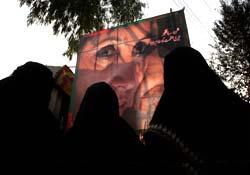Benazir’s assassination has heightened hostility towards Pak Punjab
 Karachi, Feb 11: The death of former premier Benazir Bhutto, a native of Sindh province, has heightened hostility toward Punjab, Pakistan’s centre of power, the Los Angeles Times has said.
Karachi, Feb 11: The death of former premier Benazir Bhutto, a native of Sindh province, has heightened hostility toward Punjab, Pakistan’s centre of power, the Los Angeles Times has said.
On the day Benazir died, Yousef Leghari watched his native Sindh province erupt.
For five days, people vented their rage by firing weapons, and setting fire to vehicles and buildings. Bhutto was Sindh's native daughter, and she had been assassinated.
The popular opposition leader had been killed in Punjab province, Pakistan's locus of government and military power, and a source of envy in Sindh and other minority provinces.
Along with the tragedy, Leghari now sees opportunity. He and other local politicians have long wanted Sindh to secede from Pakistan, but separatist talk had gained scant support among voters.
At Bhutto's funeral, thousands of angry mourners took to the streets. "We hate Pakistan," they chanted. "We don't want to be part of Pakistan!"
Bhutto's death has heightened bitter regional rivalries in this Muslim nation of 165 million. The fragile federation, founded in 1947, encompasses five major ethnic groups now facing growing social and economic divides.
Over the years, successive governments have spent billions of dollars on a strong military to hold the nuclear-armed nation together. Yet dysfunction prevails.
Pakistan's three minority provinces -- Sindh, Balochistan and North-West Frontier Province -- have long contended that Punjab, the most populous province, dominates the federal bureaucracy and gets a disproportionate share of resources.
Pakistan, or "land of the pure," should be renamed Punjab, for all its bias, Leghari and others believe. They say trouble looms unless other provinces win more power in elections scheduled for February 18.
Punjab, with about as many residents as the rest of Pakistan combined, historically has held a majority of seats in the National Assembly, the lower house of the parliament.
In Balochistan, Pakistan's largest and poorest province, where battles have been waged sporadically for years, fighting erupted again in 2006 when government security forces killed Nawab Akbar Bugti, a 79-year-old nationalist leader who had led the area's struggle for political autonomy.
Demanding a share of the government's gas and mineral wealth, Bugti had ordered attacks on gas pipelines and oil installations.
"We have never felt a part of Pakistan," said Sardar Ataullah Mengal, chief of the Balochistan National Party. "They're colonizing our land and turning our people into a minority. Pakistan doesn't want our people. It wants our resources," he added.
Ethnic Pashtuns, who mainly inhabit the country's volatile northwest, also demand that Pakistan's political and economic balance be shifted. Many have joined tribesmen on the other side of the border in Afghanistan for a violent insurgency against both governments.
Residents of Sindh, the second-most populous province, say that the central government takes more than it gives.
"Sindh can survive on its own," said Leghari, who is also a lawyer and activist. "We've got our own port and enough coal to burn for 5,000 years. Pakistan's civil society is broken. There's no free judiciary or press. Who wants to be a part of that?"
But Bhutto's death was the harshest blow of all. She was expected to look out for Sindhi interests if she was returned to power. Instead, she was the third Pakistani Prime Minister associated with Sindh to die in the Punjabi city of Rawalpindi.
Pakistan's first premier, Liaquat Ali Khan, was shot to death in 1951, and Bhutto's own father, Zulfikar Ali Bhutto, was hanged in 1979 after his government was toppled in a coup.
"Benazir was killed because she was a Sindhi," Leghari said. "And once again, we have the Punjabis to blame." (ANI)